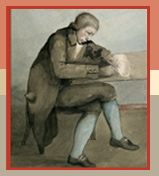
Iolo's People
Edward 'Celtic' Davies (1751-1831)
Evan Davies (Myfyr Morganwg, 1801-88)
Walter Davies (Gwallter Mechain, 1761–1849)
T C Evans (Cadrawd, 1846-1914)
Owen Jones (Owain Myfyr, 1741–1814)
Sir John Morris Jones (1864-1929)
William Owen Pughe (1759-1835)
William John Roberts (Gwilym Cowlyd, 1828-1904)
David Samwell (Dafydd Ddu Feddyg, 1751–98)
David Thomas (Dafydd Ddu Eryri, 1759–1822)
Griffith John Williams (1892-1963)
John Williams (Ab Ithel, 1811-62)
Edward Evan (1716-98)
Edward Evan, a poet from Llwyn-coed near Aberdare, was one of Iolo Morganwg's poetic teachers. He was an Arian, but towards the end of his life he tended towards Unitarianism. He was an important figure in Iolo's cultural and religious development and this perhaps explains why Iolo gave him such a prominent position in bardism.
Edward Evan had been an apprentice carpenter and glazier under the care of Lewis Hopkin, Hendre Ifan Goch. In 1772 he was ordained a minister and served the Old Meeting House (Hen DŸ Cwrdd) in Aberdare until 1796. As a craftsman and a Dissenter, Edward Evan conforms to a common pattern found among the 'Gramadegyddion' (Grammarians), the poets of Glamorgan of his time. Since he also translated poems by Alexander Pope, Samuel Butler, Isaac Watts and Bishop Horne into Welsh, he may also have been a formative influence on Iolo's taste in English poetry as well as Welsh strict-metre poetry.
Edward Evan's poetry was published posthumously by his son, Rhys Evans. The first edition was entitled Caniadau Moesol a Duwiol (1804) (Moral and Godly Songs), but subsequent editions were published under the title Afalau'r Awen (1816; 1837; 1874) (Fruits of the Muse). Edward Evan was known by the bardic names Iorwerth ab Ioan and Iorwerth Gwynfardd Morganwg.
This was the historical Edward Evan, but in Iolo's bardic vision he was transformed into a principal figure in the alleged druidical lineage that served as a foundation for bardism. In a letter aimed at attracting subscribers to his English poetry published in the fashionable Gentleman's Magazine, Iolo claimed that he and Edward Evan were the only genuine remaining bards in that lineage. Iolo made similar claims in the material on bardism published in The Heroic Elegies of Llywarç Hen (1792).
Although Edward Evan took part in several Gorsedd meetings in Glamorgan, his own poetry does not suggest that he saw himself in the same light. Iolo, however, was not merely motivated by vanity. As a member of the Grammarians who met in eisteddfodau and bardic meetings at Llantrisant and Cymer, Edward Evan had been a part of the cultural awakening in Glamorgan. In turn, therefore, the Grammarians were part of the wider cultural awakening in Wales usually associated with the Cymmrodorion and Gwyneddigion societies, and especially with one of north Wales's greatest sons, Lewis Morris. Iolo promoted Edward Evan and others because he felt that the poets and writers of Glamorgan had not received adequate recognition for their contributions:
y Parchedig Edward Ifan o Aberdar ym Morganwg a ddylai gael ei gofio. Nid llai ei ddysgeidiaeth ef nag eiddo Ieuan Bradford a Lewys Hopcin ac yn ben ar y cwbl nid neb yn eu gwlad na hoes yn [haeddu] gwell gair amdanynt am bob campau da a cymmydogaidd a Theuluaidd nag yr oeddynt hwy.
[The Reverend Edward Evan of Aberdare in Glamorgan should be remembered. His learning was no less than that of John Bradford and Lewis Hopkin and, furthermore, no-one in their country and time [deserves] a better word for all their good, neighbourly and domestic deeds than they.] (NLW 13141A, p. 131)
[The Reverend Edward Evan of Aberdare in Glamorgan should be remembered. His learning was no less than that of John Bradford and Lewis Hopkin and, furthermore, no-one in their country and time [deserves] a better word for all their good, neighbourly and domestic deeds than they.] (NLW 13141A, p. 131)

